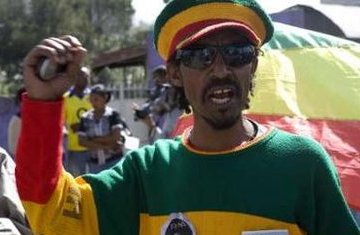
Above: A supporter of Ethiopia’s Unity for Democracy and
Justice party (UDJ) shouts slogans during a demonstration in
the capital Addis Ababa, April 16, 2009. Ethiopians marched on
Thursday to demand the release of a jailed opposition leader in
the first political protests since a disputed 2005 election ended
in street violence that killed 199 people. (REUTERS)
ADDIS ABABA, Ethiopia, April 16 (UPI) — The mother of a jailed Ethiopian opposition leader says she hopes to have her daughter home in time for this weekend’s Ethiopian Orthodox Easter holiday. Almaz GebreEgziabher took part in a protest march in Addis Ababa Thursday demanding the release of Birtukan Medeska, who had been granted a pardon that was repealed. Read more.
By Barry Malone
ADDIS ABABA, April 16 (Reuters) – Ethiopians marched on Thursday to demand the release of a jailed opposition leader in the first political protests since a disputed 2005 election ended in street violence that killed 199 people. Birtukan Mideksa, the 34-year-old leader of the Unity for Democracy and Justice party (UDJ), was first jailed with other opposition leaders after the 2005 poll. She was pardoned in 2007 but then re-arrested last year. The former judge has been in solitary confinement since December and went on hunger strike for 13 days in January. “We are marching today to tell the government that the imprisonment of our leader is illegal,” said Debebe Eshetu, a senior UDJ official who was also jailed in 2005. Read more.
Related: Birtukan Mideksa – The Judge Who Refused to Say Sorry
The Independent, U.K.
By Daniel Howden
Birtukan Mideksa has been sentenced to life in prison. She spends her days and nights in solitary confinement in a two-metre by two-metre cell. She cannot leave it to see daylight or even to receive visitors. Previous inmates say the prison is often unbearably hot.
Her crime: refusing to say sorry. The judge, aged 34, is the head of Ethiopia’s most popular political party, the only female leader of a main opposition party in Africa.
The government in Addis Ababa had her arrested on 28 December, claiming she had violated the terms of an earlier pardon.
Her previous release in 2007, which came after serving two years in prison, was conditional on her signing an apology for taking part in protests against fixed elections.
In November, the woman who is becoming a democratic icon in Ethiopia told an audience in Sweden that she had not asked for a pardon. On returning to Ethiopia it was demanded that she sign further apologies and, when she refused, she was re-arrested. The Ministry of Justice then issued a statement reimposing her life sentence. Read more.

























